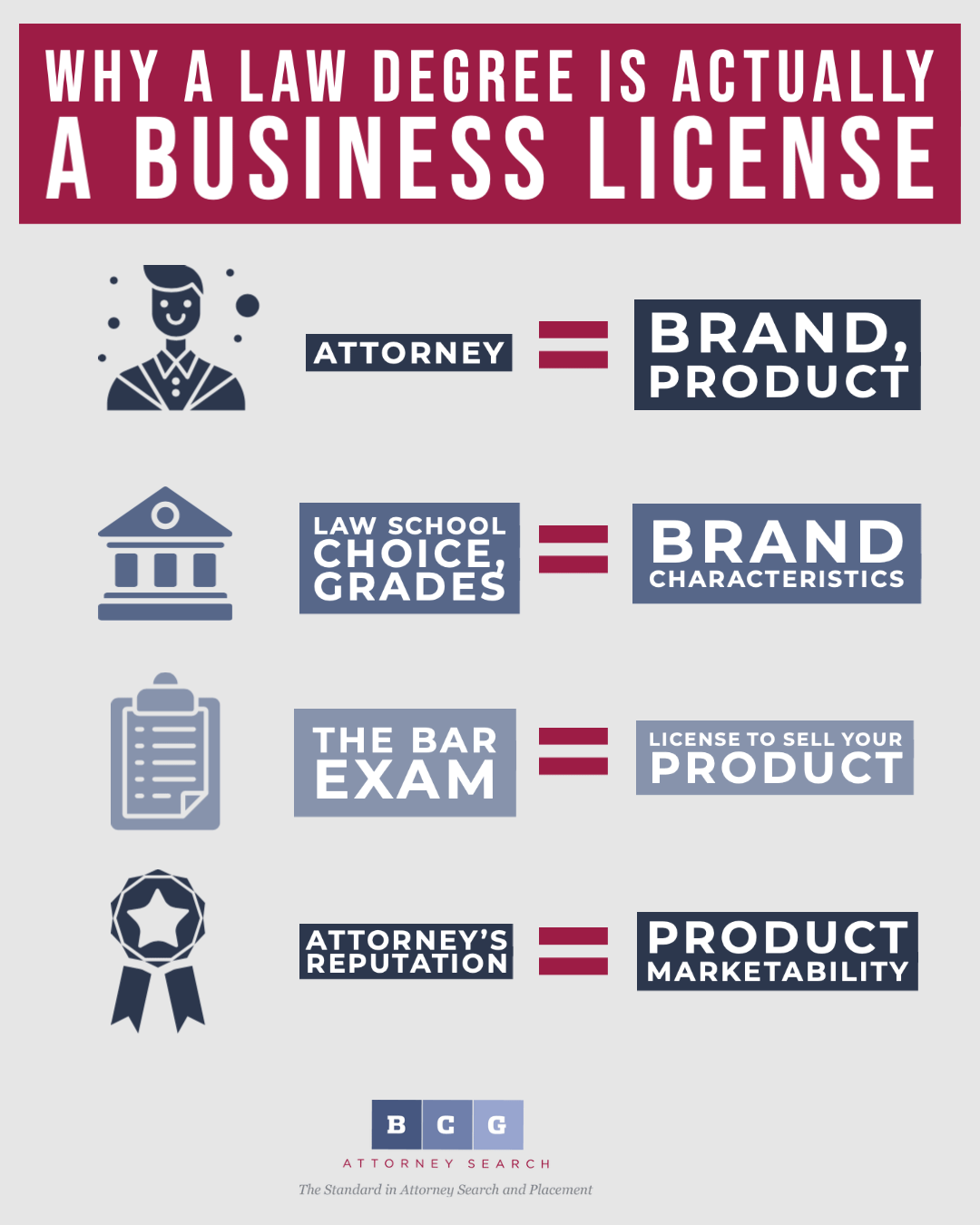Harrison Barnes' Legal Career Advice Podcast - Episode 73
- One of the main things about the law that people don't understand is that it's a business.
- Some attorneys are also unaware that their legal practices are businesses.
- Learn why, in order to succeed, you must approach your legal career like a business.
What I'm about to say may seem counterintuitive to many people who view the legal profession as a profession. Practicing law is a career. Despite the term "profession," it is still possible to be fired, to not advance, or to end up in a job that is a dead end. Your skills or specialty can quickly become irrelevant in the marketplace. You can also find yourself in a geographic location where there is no work (i.e., "business").

The problem with attorneys and the legal profession, in general, is that no one seems to take the time to consider that the law is a business and that their careers are businesses as well. Be a good business person, and your career may go far. Ignore the business realities, and you are likely to run into trouble. I have been a legal recruiter for several years and have seen countless attorneys "go out of business" because they did not run their businesses well. This is something I see daily while reviewing resumes of out-of-work attorneys. An excellent resource on combining law with entrepreneurship is Taking the Leap: A Comprehensive Guide for Attorneys Starting a Solo Practice.

|
| Harrison Barnes |
A. Your Legal Career, Like Any Business, Needs a Marketable Product
1. Early Product Qualities Will Determine How Much You Can Sell Your Product for and Where
To have a thriving business, you need to have a product or service that can be marketed and sold to people. Your business is what will ultimately sell the product. This product will need to be carefully managed throughout your career. Shortly into your legal career, you will begin developing a "brand" and taking on particular attributes that characterize your "brand."

The importance of having a marketable product begins very early in your legal career. To enter the legal profession, you need to take specific steps. If you are an attorney, the steps should be pretty obvious. First, you need to obtain an undergraduate degree. The quality of the university you graduate from and how well you perform there will impact whether or not you get into law school and the quality of law school you can attend.
Once you are in law school, you need to perform at a level appropriate to the type of position you want when you get out of law school. You will presumably do certain things along the way, such as work on a journal or your school's law review. These will all be additions to your product. In taking the time to go to law school, you are investing time and money in your product. Depending on how much money you spend and how hard you work in law school, that product will be viewed in a certain way the second you graduate.
These things will also determine how much you can charge for your product and where you can sell your product. If you go to a top law school and do well there, you can sell your product for money in a big city. If you go to a local law school that is not as highly regarded, you will likely be unable to do this. It may not be an issue if you do exceptionally well at a local law school.
The next step comes when you take an exam (i.e., the Bar Exam) to get a license to sell your product. Once you have been admitted to the bar of your jurisdiction, you can now formally do business in your state.
By entering the practice of law, you have made a series of decisions that have led you to open your own small business. You may be an employee of a law firm, corporation, or government. However, you run a small business when everything is said and done. Your early brand will consist of where you went to college and law school, where you summered, and what practice area you chose to get into. Coming out of law school, you may be a "hot" brand and very marketable, or you may not. In effect, it does not matter because your brand and its marketability are something that will evolve throughout your career.
2. You Must Remember That to Stay in Business, You Must Always Have a Marketable Product
As a business person and operator of a small business, you are going to be faced with countless decisions as to how you operate your own business. It would help if you remembered that every decision you make would determine your marketability.
The myriad choices available to attorneys regarding how they operate their businesses are attractive to law practice. They may brand themselves as a prominent firm lawyer, small firm lawyer, solo practitioner, government attorney, in-house attorneys—you name it. Whether an attorney works independently or for a large firm, they are always in charge of their career.
There are aspects of your product that will never change. Wherever you are in your legal career, you cannot change what you have done in the past. This includes your choice of law school, your performance in law school, the first firm you worked at (or second or third), and any variety of things that you have done in your career. However, if you browse around, you'll find thousands of little businesses, and the quality of these businesses' histories does not matter.
You must also look at the legal field, like the business world. Whatever type of business you run must have a marketable product. You have a product if you are doing personal injury law at your solo law firm. You will be able to sell your product in certain areas and with specific audiences better than others. The list goes on and on. Everything is about having a marketable product throughout your career.
The goal of any business is to survive and, for many enterprises, to grow. You must first consider your company's needs and run it in a way that meets those demands. You are marketing a particular skill set and problem-solving ability as an attorney. One of the most important aspects of running your business involves the type of work you do. If you are a litigator, you will help people deal with lawsuits in one way or another. If you do tax law, you will help people deal with tax issues. In operating in a particular practice area, it is essential to understand that certain areas have more appeal (to the market) than others. Your objective is to get business, and the decisions you make in this regard are necessary.
Certain specialties may be bad business to choose from. For example, railroad law used to be a general practice area, but you would have difficulty running a small business now that focused on such an old-fashioned type of law.
Likewise, the geographic area you are in, the stability of your current employer, and your opportunity for advancement at your current firm are all factors to keep in mind in operating your small business. These are all things that will have a bearing on whether or not your business will succeed.
B. The Importance of Your "Brand" to Marketing Your Product
As the operator of a national search firm, I know that it is part of any recruiter's job to recognize the type of brand of the attorneys they are working with. While you may not have spent some time on the BCG Attorney Search website, you should know that a lot of the information on the site is simply about how attorneys can manage their brand to be marketable to large law firms. A similar collection of material may be amassed for a firm's in-house legal brand or a small law firm.
When working in the practice of law, you need to have a good brand. If you are operating your law firm, the quality of your brand will determine how many clients you get and the type of clients you get. Suppose you are practicing in a large law firm. In that case, the quality of the work you do, your interpersonal relationships, and a variety of other factors will determine the strength of your brand. The point is that all brands have specific attributes, and you will develop a particular brand over time.
Companies spend an excessive amount of money both protecting and developing their brands. Certain things come to mind when you think of any brand. For example, the thought that comes to mind is different if you think of BMW or Chevy. Likewise, RC Cola creates a different thought than Coke. A brand is developed over time. The places you work, your practice area, and all of the factors above will have a bearing on the quality of your brand.
Generally, better brands can charge more and have more interest in them than poor brands. All of the business world's rules apply to managing your brand, and it would help if you always were mindful of how you want your brand to be viewed by the outside world and potential employers. Think carefully through what type of brand you want and ensure that you manage that brand the best you can.
C. How to Market Your Brand and Product for Maximum Possible Success
As an attorney, consider hypothetically that your salary is $100,000 per year. Also, consider that you are being billed out at approximately $200 per hour and are expected to bill 2,000 hours yearly in your law firm. Your small business generates $400,000 annually, and you are "netting" $100,000. This is not bad from a business standpoint.
As a legal recruiter, I am not surprised that most attorneys want to go to the law firms that pay the most money and have the most prestige. These are all business decisions. Over time, you presumably would like the amount of money you make to increase. You would also like the percentage of the money you collect from your billings to improve. For example, if you generate $400,000 from your work, you would instead make $200,000 than $100,000, as in the previous model. You want to become a partner and earn more. The business game continues.
Everything that happens to your legal career results from selling your product in the marketplace. The amount of money you can charge (e.g., that the market will pay) will be influenced by your brand. Hypothetically you could go to a horrible law school and start in a horrible law firm. This is something thousands of attorneys do each year. Then, several years later, many of these same attorneys may earn more than a million dollars yearly. This may seem like an aberration to stuffy (sorry!) prominent firm attorneys. Nevertheless, this is not an aberration, and it always happens. The reason this happens is because of how these attorneys market their brand.
Marketing is the most important thing you can do for yourself as an attorney. Marketing is about how you package yourself, the things you say, and the value the market perceives that you offer. You may not want to market yourself to a large law firm. In addition, you may not want to work for someone else at all. Instead, you may want to open your practice and market your services there.
See How to Make a Lot of Money Practicing Law for more information
The point of this essay is not to act as a rant on marketing; however, a few comments on marketing should make a helpful point. When you market a product, you need to appeal to people on both an emotional and rational (cost) level. When marketing personal services—which your legal skills are—people tend to want to deal with people like themselves. For that reason, large law firms prefer a specific type of attorney; small law firms prefer a particular type of attorney, and certain types of clients (rich, poor, and in between) prefer dealing with a specific type of attorney. We tend to want to deal with people like us. Thus, your product is likely to be well accepted in some areas and not others.
I remember when I was clerking for a federal judge and had the opportunity to see different trial lawyers come into court and conduct trials. I also spent a year trying to write a book about personal injury attorneys several years ago. The one thing I noticed about the most effective personal injury attorneys was that they were nothing like prominent attorneys and rarely had considerable firm experience or top law school credentials. What they did know how to do was market themselves and their clients' grievances to like-minded jurors.
They also tend to be flamboyant in their marketing efforts—but that is another story.
In small towns all across America, there are very successful attorneys. In most cases, these attorneys grew up in the area and are like the people they work for. What is most significant about the attorneys who are most successful among those who are not in small towns is their marketing ability. Stories circulate about their successes, and all of this is marketing.
- See 30 Ways to Generate Business as an Attorney for more information.
The same thing occurs in large law firms in big cities. Here, the marketing is confined to the law firm and getting clients to come to your firm as you advance in seniority. What is most significant, though, is that the marketing component and what the individual's brand represents are always at the forefront.
The issue then is how you market yourself and advance your career. While this may not be obvious, a large part of a legal recruiter's job is helping attorneys market themselves to employers. They know what the employers want to hear and how the attorney should say it. Virtually every week at BCG Attorney Search, we get attorneys' jobs at firms that I know they could not have gotten on their own. That is because we "packaged" the attorney and told them what to say to portray the particular brand the firm is interested in.
- See The Four Types of Attorneys: The Finder, Minder, Binder and Grinder for more information.
What is so interesting about our work at BCG Attorney Search is that none of what we do is dishonest. It just knows the market and the particular brand of the firm and what makes an attorney marketable to them. Attorneys need to be themselves and be aware of what the particular customer wants.
D. Conclusions
You are a product. Your legal career is a small business. Run it like a small business and realize the importance of your brand. Most importantly, realize you always need to have a market for your product. If you remember this, you will be well served throughout your legal career.
Click here to contact Harrison
About Harrison Barnes
No legal recruiter in the United States has placed more attorneys at top law firms across every practice area than Harrison Barnes. His unmatched expertise, industry connections, and proven placement strategies have made him the most influential legal career advisor for attorneys seeking success in Big Law, elite boutiques, mid-sized firms, small firms, firms in the largest and smallest markets, and in over 350 separate practice areas.
A Reach Unlike Any Other Legal Recruiter
Most legal recruiters focus only on placing attorneys in large markets or specific practice areas, but Harrison places attorneys at all levels, in all practice areas, and in all locations-from the most prestigious firms in New York, Los Angeles, and Washington, D.C., to small and mid-sized firms in rural markets. Every week, he successfully places attorneys not only in high-demand practice areas like corporate and litigation but also in niche and less commonly recruited areas such as:
- Immigration Law
- Workers Compensation
- Insurance
- Family Law
- Trust and Estate
- Municipal law
- And many more...
This breadth of placements is unheard of in the legal recruiting industry and is a testament to his extraordinary ability to connect attorneys with the right firms, regardless of market size or practice area.
Proven Success at All Levels
With over 25 years of experience, Harrison has successfully placed attorneys at over 1,000 law firms, including:
- Top Am Law 100 firms such including Sullivan and Cromwell, and almost every AmLaw 100 and AmLaw 200 law firm.
- Elite boutique firms with specialized practices
- Mid-sized firms looking to expand their practice areas
- Growing firms in small and rural markets
He has also placed hundreds of law firm partners and has worked on firm and practice area mergers, helping law firms strategically grow their teams.
Unmatched Commitment to Attorney Success - The Story of BCG Attorney Search
Harrison Barnes is not just the most effective legal recruiter in the country, he is also the founder of BCG Attorney Search, a recruiting powerhouse that has helped thousands of attorneys transform their careers. His vision for BCG goes beyond just job placement; it is built on a mission to provide attorneys with opportunities they would never have access to otherwise. Unlike traditional recruiting firms, BCG Attorney Search operates as a career partner, not just a placement service. The firm's unparalleled resources, including a team of over 150 employees, enable it to offer customized job searches, direct outreach to firms, and market intelligence that no other legal recruiting service provides. Attorneys working with Harrison and BCG gain access to hidden opportunities, real-time insights on firm hiring trends, and guidance from a team that truly understands the legal market. You can read more about how BCG Attorney Search revolutionizes legal recruiting here: The Story of BCG Attorney Search and What We Do for You.
The Most Trusted Career Advisor for Attorneys
Harrison's legal career insights are the most widely followed in the profession.
- His articles on BCG Search alone are read by over 150,000 attorneys per month, making his guidance the most sought-after in the legal field. Read his latest insights here.
- He has conducted hundreds of hours of career development webinars, available here: Harrison Barnes Webinar Replays.
- His placement success is unmatched-see examples here: Harrison Barnes' Attorney Placements.
- He has created numerous comprehensive career development courses, including BigLaw Breakthrough, designed to help attorneys land positions at elite law firms.
Submit Your Resume to Work with Harrison Barnes
If you are serious about advancing your legal career and want access to the most sought-after law firm opportunities, Harrison Barnes is the most powerful recruiter to have on your side.
Submit your resume today to start working with him: Submit Resume Here
With an unmatched track record of success, a vast team of over 150 dedicated employees, and a reach into every market and practice area, Harrison Barnes is the recruiter who makes career transformations happen and has the talent and resources behind him to make this happen.
A Relentless Commitment to Attorney Success
Unlike most recruiters who work with only a narrow subset of attorneys, Harrison Barnes works with lawyers at all stages of their careers, from junior associates to senior partners, in every practice area imaginable. His placements are not limited to only those with "elite" credentials-he has helped thousands of attorneys, including those who thought it was impossible to move firms, find their next great opportunity.
Harrison's work is backed by a team of over 150 professionals who work around the clock to uncover hidden job opportunities at law firms across the country. His team:
- Finds and creates job openings that aren't publicly listed, giving attorneys access to exclusive opportunities.
- Works closely with candidates to ensure their resumes and applications stand out.
- Provides ongoing guidance and career coaching to help attorneys navigate interviews, negotiations, and transitions successfully.
This level of dedicated support is unmatched in the legal recruiting industry.
A Legal Recruiter Who Changes Lives
Harrison believes that every attorney-no matter their background, law school, or previous experience-has the potential to find success in the right law firm environment. Many attorneys come to him feeling stuck in their careers, underpaid, or unsure of their next steps. Through his unique ability to identify the right opportunities, he helps attorneys transform their careers in ways they never thought possible.
He has worked with:
- Attorneys making below-market salaries who went on to double or triple their earnings at new firms.
- Senior attorneys who believed they were "too experienced" to make a move and found better roles with firms eager for their expertise.
- Attorneys in small or remote markets who assumed they had no options-only to be placed at strong firms they never knew existed.
- Partners looking for a better platform or more autonomy who successfully transitioned to firms where they could grow their practice.
For attorneys who think their options are limited, Harrison Barnes has proven time and time again that opportunities exist-often in places they never expected.
Submit Your Resume Today - Start Your Career Transformation
If you want to explore new career opportunities, Harrison Barnes and BCG Attorney Search are your best resources. Whether you are looking for a BigLaw position, a boutique firm, or a move to a better work environment, Harrison's expertise will help you take control of your future.
Submit Your Resume Here to get started with Harrison Barnes today.
Harrison's reach, experience, and proven results make him the best legal recruiter in the industry. Don't settle for an average recruiter-work with the one who has changed the careers of thousands of attorneys and can do the same for you.
About BCG Attorney Search
BCG Attorney Search matches attorneys and law firms with unparalleled expertise and drive, while achieving results. Known globally for its success in locating and placing attorneys in law firms of all sizes, BCG Attorney Search has placed thousands of attorneys in law firms in thousands of different law firms around the country. Unlike other legal placement firms, BCG Attorney Search brings massive resources of over 150 employees to its placement efforts locating positions and opportunities its competitors simply cannot. Every legal recruiter at BCG Attorney Search is a former successful attorney who attended a top law school, worked in top law firms and brought massive drive and commitment to their work. BCG Attorney Search legal recruiters take your legal career seriously and understand attorneys. For more information, please visit www.BCGSearch.com.
Harrison Barnes does a weekly free webinar with live Q&A for attorneys and law students each Wednesday at 10:00 am PST. You can attend anonymously and ask questions about your career, this article, or any other legal career-related topics. You can sign up for the weekly webinar here: Register on Zoom
Harrison also does a weekly free webinar with live Q&A for law firms, companies, and others who hire attorneys each Wednesday at 10:00 am PST. You can sign up for the weekly webinar here: Register on Zoom
You can browse a list of past webinars here: Webinar Replays
You can also listen to Harrison Barnes Podcasts here: Attorney Career Advice Podcasts
You can also read Harrison Barnes' articles and books here: Harrison's Perspectives
Harrison Barnes is the legal profession's mentor and may be the only person in your legal career who will tell you why you are not reaching your full potential and what you really need to do to grow as an attorney--regardless of how much it hurts. If you prefer truth to stagnation, growth to comfort, and actionable ideas instead of fluffy concepts, you and Harrison will get along just fine. If, however, you want to stay where you are, talk about your past successes, and feel comfortable, Harrison is not for you.
Truly great mentors are like parents, doctors, therapists, spiritual figures, and others because in order to help you they need to expose you to pain and expose your weaknesses. But suppose you act on the advice and pain created by a mentor. In that case, you will become better: a better attorney, better employees, a better boss, know where you are going, and appreciate where you have been--you will hopefully also become a happier and better person. As you learn from Harrison, he hopes he will become your mentor.
To read more career and life advice articles visit Harrison's personal blog.











